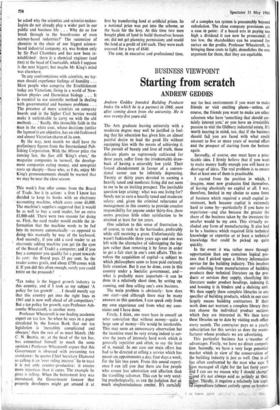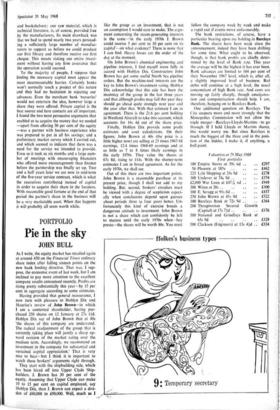Starting from scratch
BUSINESS VIEWPOINT ANDREW GEDDES
Andrew Geddes founded Building Products Index (in. which he is a partner) in 1966, soon after coming down from the university. He is now twenty-five years old.
The Arts graduate leaving university with a moderate degree may well be justified in feel- ing that his education has given him an almost painful desire to lead the good life without equipping him with the means of achieving it. The pursuit of beauty and love of truth, those delicate plants so rapturously cultivated for three years, suffer from the irredeemable draw- back of having a miserably low yield. Their forced abandonment in favour of a conven- tional career can be infinitely depressing. Twenty or thirty years devoted to earning a heavily taxed and moderate living did not seem to me to be an inviting prospect. The inevitable question kept arising: what was one living for? Surely not to earn a heavily taxed and moderate salary; and, given the criminal reluctance of management in this country to provide creative responsibility for anyone under thirty-five, there seems precious little other satisfaction to be attained at least for ten years. • One solution to this sense of frustration is, of course, to rush to the barricades, preferably while still receiving a grant. Unfortunately this wasn't fashionable three years ago and one was left with the alternative of sidestepping the log- jam rather than removing it by force in order to get a fair start in one's own affairs. This in- volves the acquisition of capital—a subject to which philosophers seem to have paid curiously little attention. But it can be done, even in this country under a Socialist government, and— what is probably more important—it can be done in a relatively short time, by setting up, running, and then selling one's own business.
The main problem is obviously: how does one start—and although there may be many answers to this question, I can speak only from my own experience and from what my asso- ciates and I have done.
Firstly, I think, one must have in oneself an utter conviction that without money—quite a large sum of money—life would be intolerable. This may seem an unnecessary observation but the incentive must be very strong indeed to sur- vive the years of intensely hard work which is generally repetitive and often, to say the least of it, menial. In our case our main effort has had to be directed at selling a service which has meant six appointments a day, four days a week, for the lalt two years. From this sound experi- ence I can tell you that there are few people who arouse less admiration and affection than the travelling salesman. This can be very wear: ing psychologically, as can the isolation that so much singlemindedness creates. Its certarnii not the best environment if you want to make friends or visit exciting places—unless, of course, the friends you want to make are other salesmen who have 'something that should cer- tainly interest you,' or you have an irresistible passion to visit the Oldbury industrial estate. It's worth bearing in mind, too, that if the business should fail you are faced with what could amount to five or more years of wasted effort and the prospect of starting from the bottom again.
Secondly, of course, one must have a prac- ticable idea. I firmly believe that if you want to make money badly enough you will have no shortage of ideas. The real problem is to ensure that at least one of them is practicable.
I started from the position in which, I imagine, most new graduates find themselves, of having absolutely no capital at all. I was, therefore, limited in my choice to some form of business which required a small capital in- vestment, both because capital is extremely hard to' come by—particularly if you have no experience—and also because the greater the share of the business taken by the investors the smaller would be my own. This virtually ex- cluded any form of manufacturing. It also had to be a business which required little technical knowledge or expertise or at least a technical knowledge that could be picked up quite quickly.
In the event it was rather more through opportunism than any conscious logical pro- cess that I picked upon a library information service for the building industry. This involves our collecting from manufacturers of building products their technical literature on the pro- ducts or services they supply, classifying this literature under product headings, indexing it, and housing it in binders and a shelving unit. We then supply these complete libraries to any specifier of building products, which in our case largely means building contractors. If their work does not warrant a complete library they can choose the individual product sections which they are interested in. We -then keep these libraries up to date by visiting each office every month. The contractor pays us a yearly subscription for this service as does the manu- facturer whose products we are advertising.
This particular business has a /number of advantages. Firstly, we have no direct competi- tion. Secondly, we have a very large potential Market which in view of the conservatism of the building industry is just as well. One is all too often confronted by the man who says have managed all right for the last forty years rand I can see no reason why I should change' and it's not always said as politely as that, .11e..r. Thirdly, it requires a relatively low cap- fil-expenditure (almost entirely spent on binders
and bookshelves): our raw material, which is technical literature, is, of course, provided, free by the manufacturers. Its main drawback was that we had to spend nearly two years persuad- ing a sufficiently large number of manufac- turers to support us before we could produce our first library and therefore receive our first cheque. This meant risking our entire invest- ment without having any firm assurance that the operation would succeed.
To the majority of people, I suppose that finding the necessary capital must appear the most insurmountable barrier. Certainly banks won't normally touch a project of this nature and they had no hesitation in rejecting our advances. Even the merchant bank 'nurseries' would not entertain the idea, however large a share they were offered. Private capital is the best source and here contacts are all important. I found the two most persuasive arguments that enabled us to acquire the money that we needed —apart from offering 50 per cent of the equity —was a partner with business experience who was• prepared to put in all his savings; and a preliminary market survey which I carried out, and which seemed to indicate that there was a need for the service we intended to provide. Even so it took us six months and a large num- ber of meetings with encouraging financiers who offered more encouragement than finance before the partnership was finally set up. Two and a half years later we are now in mid-term of the five-year service contract, which is what the executives contributed instead of capital in order to acquire their share in the business. With reasonable good fortune at the end of that period the partner's share in the business will be a very marketable asset. When that happens it will probably all seem worth while.







































 Previous page
Previous page